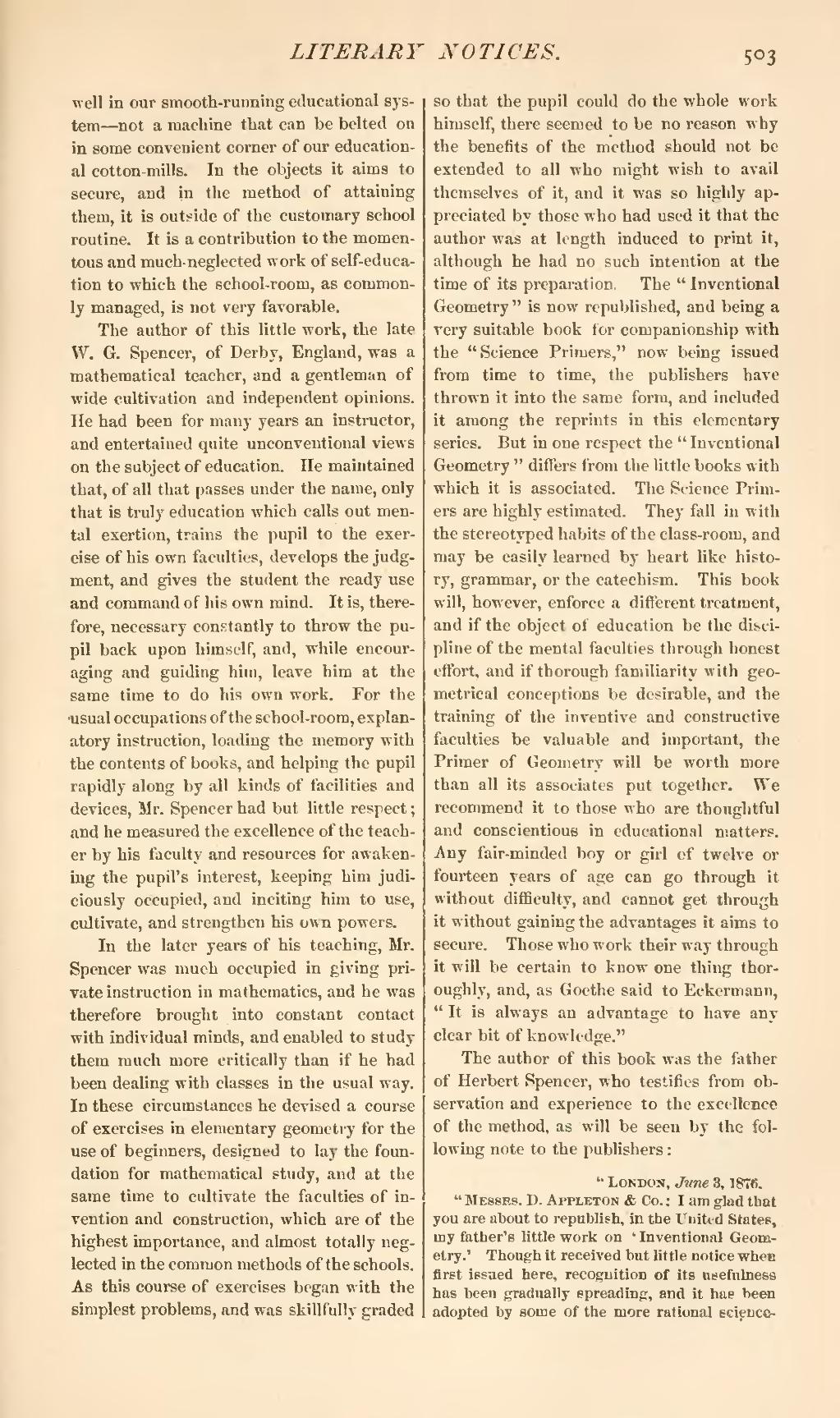well in our smooth-running educational system—not a machine that can be belted on in some convenient corner of our educational cotton-mills. In the objects it aims to secure, and in the method of attaining them, it is outside of the customary school routine. It is a contribution to the momentous and much-neglected work of self-education to which the school-room, as commonly managed, is not very favorable.
The author of this little work, the late W. G. Spencer, of Derby, England, was a mathematical teacher, and a gentleman of wide cultivation and independent opinions. He had been for many years an instructor, and entertained quite unconventional views on the subject of education. He maintained that, of all that passes under the name, only that is truly education which calls out mental exertion, trains the pupil to the exercise of his own faculties, develops the judgment, and gives the student the ready use and command of his own mind. It is, therefore, necessary constantly to throw the pupil back upon himself, and, while encouraging and guiding him, leave him at the same time to do his own work. For the usual occupations of the school-room, explanatory instruction, loading the memory with the contents of books, and helping the pupil rapidly along by all kinds of facilities and devices, Mr. Spencer had but little respect; and he measured the excellence of the teacher by his faculty and resources for awakening the pupil's interest, keeping him judiciously occupied, and inciting him to use, cultivate, and strengthen his own powers.
In the later years of his teaching, Mr. Spencer was much occupied in giving private instruction in mathematics, and he was therefore brought into constant contact with individual minds, and enabled to study them much more critically than if he had been dealing with classes in the usual way. In these circumstances he devised a course of exercises in elementary geometry for the use of beginners, designed to lay the foundation for mathematical study, and at the same time to cultivate the faculties of invention and construction, which are of the highest importance, and almost totally neglected in the common methods of the schools. As this course of exercises began with the simplest problems, and was skillfully graded so that the pupil could do the whole work himself, there seemed to be no reason why the benefits of the method should not be extended to all who might wish to avail themselves of it, and it was so highly appreciated by those who had used it that the author was at length induced to print it, although he had no such intention at the time of its preparation. The "Inventional Geometry" is now republished, and being a very suitable book for companionship with the "Science Primers," now being issued from time to time, the publishers have thrown it into the same form, and included it among the reprints in this elementary series. But in one respect the "Inventional Geometry" differs from the little books with which it is associated. The Science Primers are highly estimated. They fall in with the stereotyped habits of the class-room, and may be easily learned by heart like history, grammar, or the catechism. This book will, however, enforce a different treatment, and if the object of education be the discipline of the mental faculties through honest effort, and if thorough familiarity with geometrical conceptions be desirable, and the training of the inventive and constructive faculties be valuable and important, the Primer of Geometry will be worth more than all its associates put together. We recommend it to those who are thoughtful and conscientious in educational matters. Any fair-minded boy or girl cf twelve or fourteen years of age can go through it without difficulty, and cannot get through it without gaining the advantages it aims to secure. Those who work their way through it will be certain to know one thing thoroughly, and, as Goethe said to Eckermann, "It is always an advantage to have any clear bit of knowledge."
The author of this book was the father of Herbert Spencer, who testifies from observation and experience to the excellence of the method, as will be seen by the following note to the publishers:
"London, June 3, 1876.
"Messrs. D. Appleton & Co.: I am glad that you are about to republish, in the United States, my father's little work on 'Inventional Geometry.' Though it received but little notice when first issued here, recognition of its usefulness has been gradually spreading, and it has been adopted by some of the more rational science-
